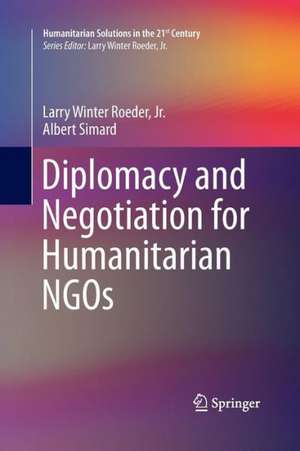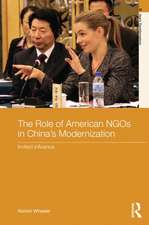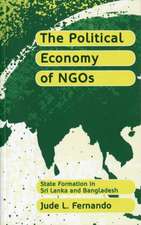Diplomacy and Negotiation for Humanitarian NGOs: Humanitarian Solutions in the 21st Century
Autor Larry Winter Roeder, Jr., Albert Simarden Limba Engleză Paperback – 23 iun 2015
| Toate formatele și edițiile | Preț | Express |
|---|---|---|
| Paperback (1) | 698.00 lei 38-44 zile | |
| Springer – 23 iun 2015 | 698.00 lei 38-44 zile | |
| Hardback (1) | 580.10 lei 38-44 zile | |
| Springer – 25 mai 2013 | 580.10 lei 38-44 zile |
Preț: 698.00 lei
Preț vechi: 734.74 lei
-5% Nou
133.62€ • 137.50$ • 112.64£
Carte tipărită la comandă
Livrare economică 25 februarie-03 martie
Specificații
ISBN-10: 148999341X
Pagini: 476
Ilustrații: XVIII, 456 p.
Dimensiuni: 155 x 235 x 25 mm
Greutate: 0.66 kg
Ediția:2013
Editura: Springer
Colecția Springer
Seria Humanitarian Solutions in the 21st Century
Locul publicării:New York, NY, United States
Public țintă
Professional/practitionerCuprins
Notă biografică
Textul de pe ultima copertă
Diplomacy and Negotiation for Humanitarian NGOs presents a richly detailed practical guide for modern NGO diplomacy and negotiation. Its clearly developed steps, from team building to decision making and coalition building to cultural awareness, suggest opportunities for expanding the work of NGOs in creating positive outcomes. Instructive cases from the past and useful illustrations from current times offer success stories, warn of pitfalls, and describe skills in action for valuable insights into the negotiation process. These guidelines can be used as is or modified to suit specific situations, or stakeholders. Chapters focus on key areas such as:
- The roles of NGOs in war and peace.
- Information and knowledge management.
- Security, risk analysis, and intelligence.
- International funding.
- Legal matters, including international humanitarian law.
- Public Diplomacy, Communications and interacting with the media.
- Protocol, from letter formats and formal meetings to social events.
- International Conferences as a tool for policy development.
- Many case studies, including several full chapters on specific examples of how NGO diplomacy has helped shape the world we livein.
Caracteristici
Descriere
The history of diplomacy is littered with false starts, misread intentions, and cultural faux pas; yet refugees can’t be helped, nor international rules created or implemented without diplomacy. In addition, governments can’t do it all. In the 21st century, non-governmental organizations (NGOs) are at the forefront of global efforts for peace, social justice, and environmental reform. Success for today's NGO requires balancing long-term strategies and goals with day-to-day and even moment-to-moment issues--much of this taking place across the negotiation table from representatives from governments and international organizations such as the United Nations or armed non-state actors.
Diplomacy and Negotiation for Humanitarian NGOs presents a richly detailed practical guide for modern NGO diplomacy and negotiation. Its clearly developed steps, from team building to decision making and coalition building to cultural awareness, suggest opportunities for expanding the work of NGOs in creating positive outcomes. Instructive cases from the past and useful illustrations from current times offer success stories, warn of pitfalls, and describe skills in action for valuable insights into the negotiation process. These guidelines can be used as is or modified to suit specific situations, or stakeholders. Chapters focus on key areas such as:
- The roles of NGOs in war and peace.
- Information and knowledge management.
- Security, risk analysis, and intelligence.
- International funding.
- Legal matters, including international humanitarian law.
- Public Diplomacy, Communications and interacting with the media.
- Protocol, from letter formats and formal meetings to social events.
- International Conferences as a tool for policy development.
- Many case studies, including several full chapters on specific examples of how NGO diplomacy has helped shape the world we live in.
Ably bridging possibility and pragmatism, Diplomacy and Negotiation for Humanitarian NGOs is a uniquely vital resource for professionals in humanitarian relief and international development in non-profits, governments at all levels, the UN, and the Red Cross system. Indeed all types of civil society organizations can benefit from this book.



















